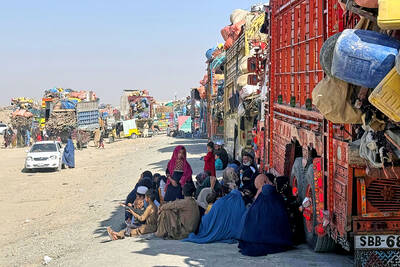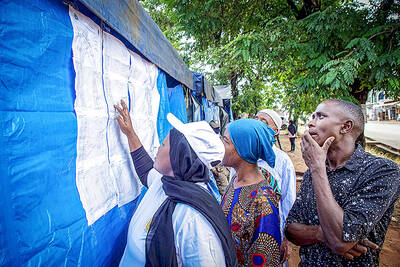Pfizer, BioNTech and Moderna are making combined profits of US$65,000 every minute from their highly successful COVID-19 vaccines while the world’s poorest countries remain largely unvaccinated, a new analysis showed.
The companies have sold the vast majority of their doses to rich countries, leaving low-income nations in the lurch, said the People’s Vaccine Alliance (PVA), a coalition campaigning for wider access to COVID-19 vaccines, which based its calculations on the companies’ earning reports.
The alliance estimated that the trio would make pre-tax profits of US$34 billion this year between them, which works out to more than US$1,000 a second, US$65,000 a minute or US$93.5 million a day.

Photo: Reuters
“It is obscene that just a few companies are making millions of dollars in profit every single hour, while just 2 percent of people in low-income countries have been fully vaccinated against coronavirus,” Maaza Seyoum of the African Alliance and People’s Vaccine Alliance Africa said.
“Pfizer, BioNTech and Moderna have used their monopolies to prioritize the most profitable contracts with the richest governments, leaving low-income countries out in the cold,” she added.
Pfizer and BioNTech have delivered less than 1 percent of their total supplies to low-income countries, while Moderna has delivered just 0.2 percent, the PVA said.

Photo: Reuters
Currently, 98 percent of people in low-income countries have not been fully vaccinated.
The three companies’ actions are in contrast to AstraZeneca and Johnson & Johnson, which provided their vaccines on a not-for-profit basis, although both have announced they foresee ending this arrangement in the future as the COVID-19 pandemic winds down.
Despite receiving public funding of more than US$8 billion, Pfizer, BioNTech and Moderna have refused calls to transfer vaccine technology to producers in low and middle-income countries via the WHO, “a move that could increase global supply, drive down prices and save millions of lives,” PVA said.
“In Moderna’s case, this is despite explicit pressure from the White House and requests from the WHO that the company collaborate in and help accelerate its plan to replicate the Moderna vaccine for wider production at its mRNA hub in South Africa,” the group said.
While Pfizer chief executive officer Albert Bourla has dismissed technology transfer as “dangerous nonsense,” the WHO’s decision to grant emergency use approval to the Indian-developed Covaxin earlier this month proves that developing countries have the capacity and expertise, the PVA added.
The PVA, whose 80 members include the African Alliance, Global Justice Now, Oxfam and UNAIDS, is calling for pharmaceutical companies to immediately suspend intellectual property rights for COVID-19 vaccines by agreeing to a proposed waiver of WTO’s TRIPS agreement.
More than 100 nations, including the US, back that move, but it is being blocked by rich countries, including the UK and Germany.

With much pomp and circumstance, Cairo is today to inaugurate the long-awaited Grand Egyptian Museum (GEM), widely presented as the crowning jewel on authorities’ efforts to overhaul the country’s vital tourism industry. With a panoramic view of the Giza pyramids plateau, the museum houses thousands of artifacts spanning more than 5,000 years of Egyptian antiquity at a whopping cost of more than US$1 billion. More than two decades in the making, the ultra-modern museum anticipates 5 million visitors annually, with never-before-seen relics on display. In the run-up to the grand opening, Egyptian media and official statements have hailed the “historic moment,” describing the

‘CHILD PORNOGRAPHY’: The doll on Shein’s Web site measure about 80cm in height, and it was holding a teddy bear in a photo published by a daily newspaper France’s anti-fraud unit on Saturday said it had reported Asian e-commerce giant Shein (希音) for selling what it described as “sex dolls with a childlike appearance.” The French Directorate General for Competition, Consumer Affairs and Fraud Control (DGCCRF) said in a statement that the “description and categorization” of the items on Shein’s Web site “make it difficult to doubt the child pornography nature of the content.” Shortly after the statement, Shein announced that the dolls in question had been withdrawn from its platform and that it had launched an internal inquiry. On its Web site, Le Parisien daily published a

‘NO WORKABLE SOLUTION’: An official said Pakistan engaged in the spirit of peace, but Kabul continued its ‘unabated support to terrorists opposed to Pakistan’ Pakistan yesterday said that negotiations for a lasting truce with Afghanistan had “failed to bring about a workable solution,” warning that it would take steps to protect its people. Pakistan and Afghanistan have been holding negotiations in Istanbul, Turkey, aimed at securing peace after the South Asian neighbors’ deadliest border clashes in years. The violence, which killed more than 70 people and wounded hundreds, erupted following explosions in Kabul on Oct. 9 that the Taliban authorities blamed on Pakistan. “Regrettably, the Afghan side gave no assurances, kept deviating from the core issue and resorted to blame game, deflection and ruses,” Pakistani Minister of

UNCERTAIN TOLLS: Images on social media showed small protests that escalated, with reports of police shooting live rounds as polling stations were targeted Tanzania yesterday was on lockdown with a communications blackout, a day after elections turned into violent chaos with unconfirmed reports of many dead. Tanzanian President Samia Suluhu Hassan had sought to solidify her position and silence criticism within her party in the virtually uncontested polls, with the main challengers either jailed or disqualified. In the run-up, rights groups condemned a “wave of terror” in the east African nation, which has seen a string of high-profile abductions that ramped up in the final days. A heavy security presence on Wednesday failed to deter hundreds protesting in economic hub Dar es Salaam and elsewhere, some